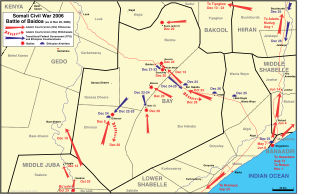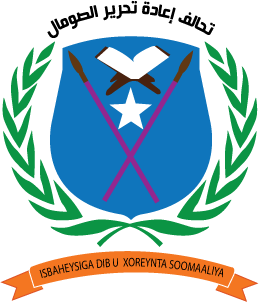
The Second Battle of Mogadishu was fought for control of Somalia's capital city, Mogadishu. The opposing forces were the Alliance for the Restoration of Peace and Counter-Terrorism (ARPCT), and militia loyal to the Islamic Courts Union (ICU). The conflict began in mid-February 2006, when Somali warlords formed the ARPCT to challenge the ICU's emerging influence. The ICU's influence was largely generated by wealthy financial donors who sought to enable the Islamic Courts Union to seize power in the country to bring stability. The battle is referred to as the Second Battle to distinguish it amongst the nine major Battles of Mogadishu during the decades-long Somali Civil War.

The Islamic Courts Union was a legal and political organization founded by Mogadishu-based Sharia courts during the early 2000s to combat the lawlessness stemming from the Somali Civil War. By mid-to-late 2006, the Islamic Courts had expanded their influence to become the de facto government in most of southern and central Somalia, succeeding in creating the first semblance of a state since 1991.

The Transitional Federal Government (TFG) was internationally recognized as a provisional government of the Somalia from 14 October 2004 until 20 August 2012, when its tenure officially ended and the Federal Government of Somalia (FGS) was inaugurated.

Sheikh Hassan Dahir Aweys (English: Hassan Dahir Aweys (Somali: Xasan Daahir Aweys, is a Somali Islamist political figure.

The Ethiopian invasion of Somalia, also known as the Ethiopian occupation of Somalia or the Ethiopian intervention in the Somali Civil War, was an armed conflict that lasted from late 2006 to early 2009. It began when military forces from Ethiopia, supported by the United States, invaded Somalia to depose the Islamic Courts Union (ICU) and install the Transitional Federal Government (TFG). The conflict continued after the invasion when an anti-Ethiopian insurgency emerged and rapidly escalated. During 2007 and 2008, the insurgency recaptured the majority of territory lost by the ICU.

The 2006 Islamic Courts Union offensive is the period in the Somali Civil War that began in May 2006 with the Islamic Courts Union's (ICU) conquest of Mogadishu from the Alliance for the Restoration of Peace and Counter-Terrorism (ARPCT) and continued with further ICU expansion in the country. Following the outbreak of the war on December 21, 2006; by December 24, direct Ethiopian intervention in the conflict in support of the Transitional Federal Government (TFG) was no longer denied by the Ethiopian government. The Eritrean government denied any involvement despite Ethiopian claims to the contrary.

The Battle of Baidoa began on 20 December 2006 when the Somali transitional federal government forces (TFG) allied with Ethiopian forces stationed there attacked advancing Islamic Courts Union (ICU) forces along with 500 alleged Eritrean troops and mujahideen arrayed against them.

The Battle of Jowhar took place during the 2006 Somali War between the Islamic Courts Union (ICU) and affiliated militias against Ethiopian and Transitional Federal Government (TFG) forces for control of the town of Jowhar. It began on December 27, 2006, when retreating ICU forces regrouped near their stronghold of Jowhar. It became the last major town and strategic stronghold of the ICU to fall to Ethiopian and TFG forces before the latter overtook Mogadishu two days later.

The fall of Mogadishu occurred on 28 December 2006, when the Ethiopian National Defence Forces (ENDF) advanced into the capital to install the Transitional Federal Government (TFG). The Islamic Courts Union (ICU), which had controlled the capital since June 2006, withdrew from the city after a week of fighting ENDF/TFG forces in southern and central Somalia.
Mohamed Qanyare Afrah (Somali: Maxamed Qanyare Afrax, Arabic: محمد افراح قنياري} was a Somali faction leader and politician who was based south of Mogadishu in the Daynile District. He came in third position in Somalia's first election as a federal country on 10 October 2004 and was subsequently appointed minister of public security in the government of Prime Minister Ali Mohammed Ghedi, He served as minister of security in 2006 but was dismissed after ignoring calls by the Prime Minister Ali Mohammed Ghedi to stop fighting forces of the Islamist Courts. He continued to participate actively in Somali political affairs being reelected to the first post transitional federal parliament of Somalia as a member of parliament, he resigned from his seat representing his clan in the summer of 2013, his seat in the Federal Parliament of Somalia was taken over by his son Cabdiweli Mohamed Qanyare.

The Battle of Jilib took place on the last day of 2006 during the Ethiopian invasion of Somalia. It was fought when Ethiopian National Defence Force (ENDF) troops and Transitional Federal Government (TFG) militia launched an offensive on the town of Jilib, held by the Islamic Courts Union (ICU).
After two decades of violence and civil war and after the Transitional Federal Government (TFG) of Somalia captured Mogadishu and Kismayo, the TFG attempted to disarm the militias of the country in late 2006. According to the UN/World Bank's Joint Needs Assessment (JNA) coordination secretariat, "the total estimated number of militias [militia members] to be demobilized is 53,000." In 2005, they estimated that "there are 11–15,000 militia people controlling Mogadishu ."
Aden Hashi Farah Aero also known as Abu Muhsin al-Ansari was a military commander of Al Shabaab. He was from the Ayr sub-clan, part of the Habar Gidir, which is a branch of the Hawiye clan. He was reportedly married to Halima Abdi Issa Yusuf. He was among several militants killed in a U.S. airstrike on 1 May 2008.

The Battle of Ras Kamboni took place during the Ethiopian invasion of Somalia at the start of 2007. It began Ethiopian National Defence Force (ENDF) and Transitional Federal Government (TFG) militia backed by United States military air power launched an offensive on Ras Kamboni, a town near the Kenyan border which was the last major urban stronghold of the Islamic Courts Union (ICU) as it with withdrew deep into the south.
Yusuf Mohammed Siad Indhacade, aka "Inda'ade" is a Somali former Minister. In 2011 he was a General in the Somali National Army. He hails from the Ayr sub-clan, part of the Habar Gidir, which is a branch of the Hawiye clan. For a short period he was Somali Minister of Defence (Somalia).
The timeline of events in the War in Somalia during 2006 is set out below.

The timeline of events in the War in Somalia during 2007 is set out below.

The Alliance for the Re–liberation of Somalia (ARS) was a political party formed in Eritrea during September 2007 as the successor to the Islamic Courts Union (ICU) during the Ethiopian military occupation of Somalia. It served as the principal political opposition to the Transitional Federal Government of Somalia (TFG) and participated in the 2007 and 2008 years of the insurgency.

The Battle of Mogadishu (2009) started in May with an Islamist offensive, when rebels from al-Shabaab and Hizbul Islam attacked and captured government bases in the capital of Mogadishu. The fighting soon spread, causing hundreds of casualties, and continued on at various levels of intensity until October. The battle's name usually includes the year, when referenced, in order to distinguish it amongst the nine major Battles of Mogadishu during the decades long Somali Civil War.

A series of battles in Hiraan, Shabeellaha Dhexe and Galgudug, between rebels of al-Shabaab and Hizbul Islam and Somali government forces and ICU militants loyal to the government, erupted during spring 2009. The fighting led to al-Shabaab capturing major government strongholds and Ethiopian forces re-entering Somalia and setting up bases in Hiraan. There was a halt in fighting during a government offensive in Mogadishu, which started on May 22.















